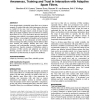Free Online Productivity Tools
i2Speak
i2Symbol
i2OCR
iTex2Img
iWeb2Print
iWeb2Shot
i2Type
iPdf2Split
iPdf2Merge
i2Bopomofo
i2Arabic
i2Style
i2Image
i2PDF
iLatex2Rtf
Sci2ools
97
Voted
CHI
2009
ACM
2009
ACM
Awareness, training and trust in interaction with adaptive spam filters
Even though adaptive (trainable) spam filters are a common example of systems that make (semi-)autonomous decisions on behalf of the user, trust in these filters has been underexplored. This paper reports a study of usage of spam filters in the daily workplace and user behaviour in training these filters (N=43). User observation, interview and survey techniques were applied to investigate attitudes towards two types of filters: a user-adaptive (trainable) and a rule-based filter. While many of our participants invested extensive effort in training their filters, training did not influence filter trust. Instead, the findings indicate that users’ filter awareness and understanding seriously impacts attitudes and behaviour. Specific examples of difficulties related to awareness of filter activity and adaptivity are described showing concerns relevant to all adaptive and (semi-) autonomous systems that rely on explicit user feedback. AUTHOR KEYWORDS Adaptivity, autonomy, spam, filters, ...
| Added | 19 May 2010 |
| Updated | 19 May 2010 |
| Type | Conference |
| Year | 2009 |
| Where | CHI |
| Authors | Henriette S. M. Cramer, Vanessa Evers, Maarten van Someren, Bob J. Wielinga |
Comments (0)

